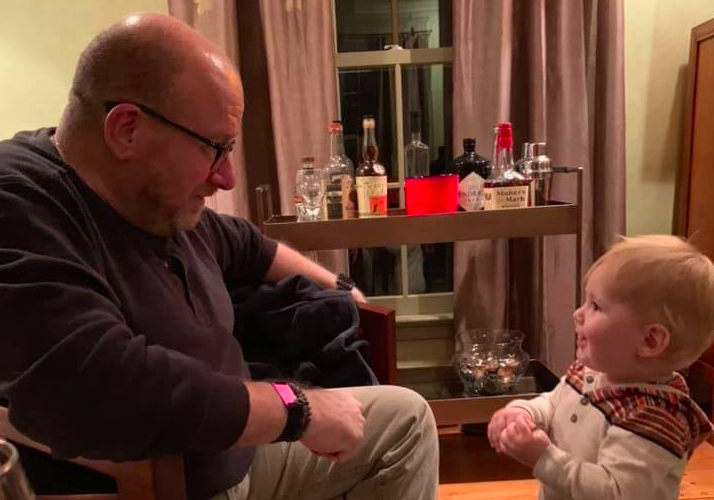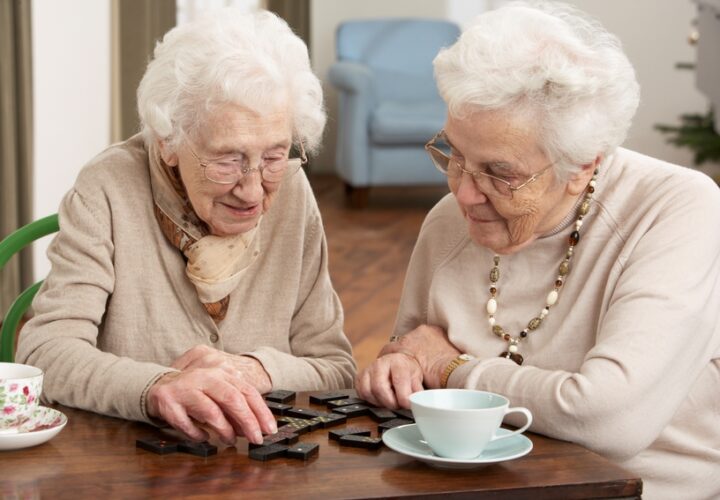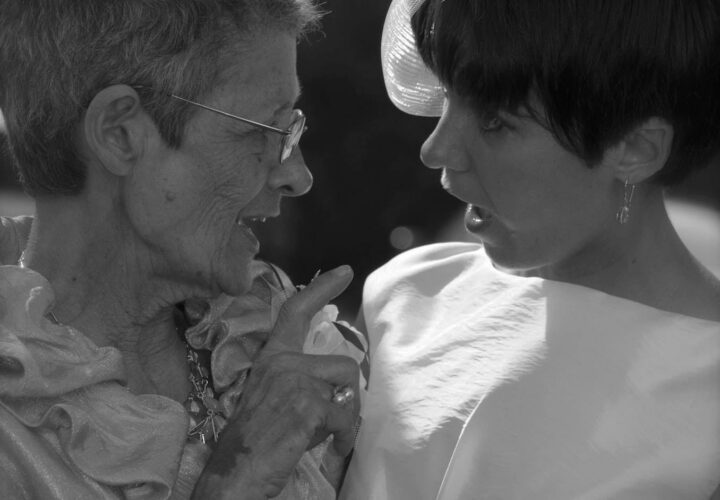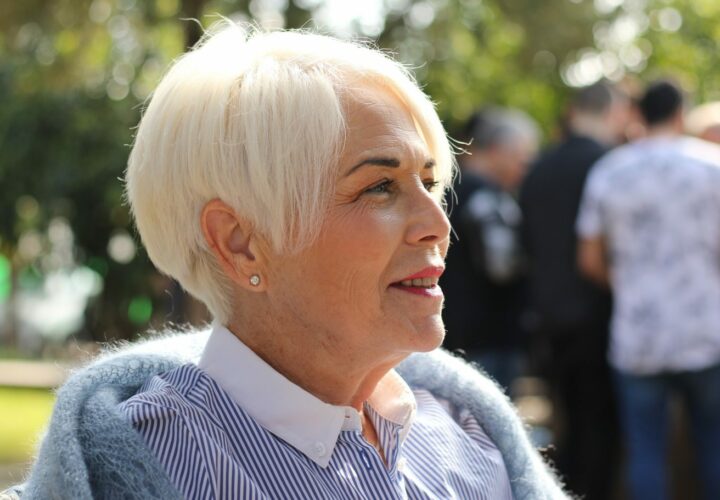The party was unremarkable. Overcrowded, yes, but nothing out of the ordinary. Within 15 minutes, however, I began to feel uncomfortable and knew that if we didn’t leave soon, I’d start to cry, my brain unable to handle the laughter and conversations swirling around me.
I turned to my husband and asked him to get our coats. He knew what was beginning to happen and, without a word, turned to head upstairs. When he returned, I slipped my coat on, told him to offer my apologies to our host and said I would meet him outside.
Breathing deeply, I stood outside, feeling relieved to be out of the party but ashamed that I was once again unable to handle a friendly crowd and thinking back on the other parties and family gatherings that ended in tears since my diagnosis about four years ago with early onset Alzheimer’s.
The holidays can be a challenging time for almost everyone but mix in a serious medical issue and the stakes become even greater. Add into the mix a neurodegenerative disorder and it becomes even more complex.
And the challenge doesn’t just impact the person living with Alzheimer’s. Family members also feel extra stress. Take my husband, Tim, for example. He has to keep an eye on me at all parties or gatherings, trying to decide if I’m becoming overwhelmed. The last thing he wants is for me to burst into tears in the middle of a happy occasion, both for me and for our hosts.
And for care partners of someone further along in their Alzheimer’s journey, the challenges can become greater. Often family members can disagree over the quality of care mom or dad is receiving. Others can become very sad seeing how far their grandparents have deteriorated.
Sometimes friends and even family can stay away from cherished traditions because they are just too uncomfortable with seeing the changes in the person living with dementia. Fear of dementia is unfortunately all too real, and even family members can be afraid to engage. And then there’s the folks who are still grieving over the loss of a parent or grandparent.
All in all, despite our best efforts and traditional norms, holidays can be a particularly difficult time. That’s why Christy Turner, also known as the “Dementia Sherpa,” recommends that people dealing with someone with Alzheimer’s always work to “bring the good stuff.”
“Respect, kindness, love, empathy and compassion,” she said in an interview. “Bring those with you and I promise you will make everything better.”
The National Institute on Aging offers some helpful hints for caregivers trying to navigate the holidays. Some highlights:
— “Set your own limits, and be clear about them with others. You do not have to live up to the expectations of friends or relatives. Your situation is different now.”
— “Encourage friends and family to visit even if it’s difficult. Limit the number of visitors at any one time, or have a few people visit quietly with the person in a separate room. Plan visits when the person usually is at his or her best.”
— Try to avoid situations that may confuse or frustrate the person with Alzheimer’s, such as crowds, changes in routine and strange places. Also try to stay away from noise, loud conversations, loud music, lighting that is too bright or too dark and having too much rich food or drink (especially alcohol).
The Alzheimer’s Association cautions that a “person living with Alzheimer’s may feel a special sense of loss during the holidays because of the changes he or she has experienced.”
“At the same time,” the Association said, “caregivers may feel overwhelmed maintaining traditions while providing care.”
One suggestion that particularly resonated with me was that caregivers send a letter or email to expected guests outlining changes in the family. Following is an edited version of the letter that would probably help my friends and family know what to expect:
I’m writing to let you know how things are going at our house. While we’re looking forward to your visit, we thought it might be helpful if you understood our current situation before you arrive.
You may notice that Phil has changed since you last saw him. Among the changes you may notice are challenges with dealing with crowds and loud noises. He may sometimes struggle for words and may even forget your name. Because Phil sometimes has problems remembering and thinking clearly, his behavior is a little unpredictable. He may get tired suddenly and need to disappear for a while to nap or otherwise regroup.
Ultimately Phil appreciates your being with us and so do we. Please treat Phil as you would any person. A warm smile and a gentle hug will be appreciated more than you know.
Turner emphasizes the physical contact, saying that it is critical that guests remember that no matter how far along in the disease progression, a person living with dementia is still at heart the same human being who they love.
“Remember they want to have a connection with you,” she said. “Even though they may not be able to fully participate in a conversation but sitting with them quietly on the sofa, holding hands may just be what they need.”
Turner’s advice reminds me of a recent Thanksgiving gathering that Tim and I attended. It is a family gathering of huge Italian and Irish families. We take care of the family’s dogs and have been considered honorary family members for several years now.
But in recent years, the crowds have been too much and I’ve typically started to get emotional or to cry during dinner and need to excuse myself to hide in a quiet room. Last year, though, I ended up spending most of the evening with a charming three-year-old.
I don’t know what about him made the crowds bearable but I had the best time that evening and, unlike previous holidays, I was left with warm feelings of the Thanksgiving holiday that I hope will remain long after other memories fade.
I hope that everyone reading this can find their own toddler to help celebrate. And here’s wishing a happy holiday and fruitful new year to all who are fighting Alzheimer’s or another form of dementia. May 2020 bring us continued and desperately needed progress in the fight against this disease.
Phil Gutis is a former New York Times reporter and current Being Patient contributor who was diagnosed with early onset Alzheimer’s. This article is part of his Phil’s Journal series, chronicling his experience living with Alzheimer’s.






You letter about the holidays almost brought me to tears. My sister is 5 years younger than me. She is only 62 and has been diagnosed with alzheimers. However her husband is not kind or understanding. He yells at her for minor issues and this year’s Christmas eve was particularly bad. I will try to get my niece to read your letter. I hope it helps. Thank you so much. God bless you in your journey.
I signed up for this talk scheduled for October 27th, but there was no information on how to call in and attend. Please advise.
– Gary DeMarco
Hi Gary,
Are you looking for this talk?
https://www.beingpatient.com/event/dr-alexis-eastman-how-caregivers-can-prepare-for-the-holidays/?utm_source=Being+Patient+Newsletter&utm_campaign=b838ba7dea-EMAIL_CAMPAIGN_2020_11_06_03_59_COPY_01&utm_medium=email&utm_term=0_95b92454c1-b838ba7dea-81787197